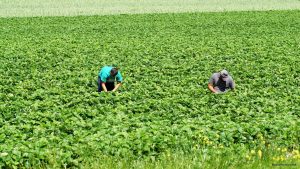
Read more
Blog, Rights, protection and inclusion
The Politics Of Regularisation Of Migrant Labour In Italy
Covid-19 has turned the Italian political debate on immigration upside down. On May 2020, the Italian government approved a new plan to temporarily regularise up to 200,000 undocumented migrants who are working or have...
Stranded: the impacts of COVID-19 in irregular migration and migrant smuggling documents how around the world, the COVID-19 response has been intentionally coupled with migration restrictions and controls, compounding the risks migrants in transit face– in particular those traveling irregularly. Responses are not limited to those aimed to stop contagion. Border closures, cancellation of court dates, increased enforcement, round-ups, immigration detention, forced removals and deportations, along with the decreased availability of search and rescue teams, implemented in coordination with COVID-19 lockdowns and restrictions, have placed those in transit and irregularly around the world in limbo. Furthermore, said measures have not stopped irregular migration nor irregular journeys. Rather, they have forced those traveling irregularly into situations of greater risk, across spaces and geographies where the likelihood of receiving assistance and rescue is scant at best.
The experiences of migrants traveling irregularly have been well documented. The literature allows us to think about the likely implications of enhanced and sudden restrictions of mobility of the kind brought about by the COVID-19 response. In recent years, this research has been supplemented by improved empirical understandings on the way migrants’ clandestine journeys take place, particularly when facilitated for profit. Known broadly as migrant smuggling, the facilitation of migrants’ irregular journeys often constitutes a community-based mobility and trade strategy, enabled by a vast range of actors. There is growing consensus among critical researchers that rather than it being the domain of organized criminal networks alone, the facilitation of migrants’ mobility is quite often a form of informal and precarious labour performed by ordinary citizens, law enforcement, migrants, refugees and asylum seekers themselves, and tribal, pastoral and indigenous communities. Often marginalized and enduring liminal lives themselves, facilitators benefit in varying degrees from migrants’ demand for mobility services. These services have simultaneously become increasingly criminalized by nation states as part of global strategies aimed to control irregular migration.
In this Migration Policy Centre brief, we argue that while the COVID-19 response does pose some unprecedented challenges, it has set in motion enforcement and control practices that are well known to the facilitators of the journeys of those who travel irregularly. In other words, many of the restrictions and challenges that COVID-19 poses have long been part of the experiences of smugglers, and are unlikely to stop their activities from occurrying. Drawing from empirical data and research we instead urge readers to pay closer attention to what the continued availability of smuggling services suggests:
- The reasons as the core of the demand for smuggling services (not only conflict, violence or poverty but most importantly the very lack of equal access to legal, safe and orderly paths for migration) remain intact, and will most likely worsen in the weeks and months to come. Unless mechanisms that foster dignified and equal access to legal paths for mobility are implemented, both irregular journeys and their facilitators will continue to exist.
- COVID-19 responses are being coupled with migration restrictions and enforcement, compounding the challenges and risks already present in the experiences of those traveling irregularly. Migration enforcement and border controls have not, and will not stop smuggling. Instead, they consistently redirect those with no option other than traveling irregularly into more perilous and deadly landscapes where the likelihood of receiving humanitarian aid is slim. In the span of a few weeks, the world has already witnessed how migration enforcement controls masked as COVID-19 responses have placed many migrants, asylum seekers and refugees in transit irregularly in situations of extraordinary risk.
- Smuggling facilitators will adapt. Yet we warn against rushing into Darwinian forecasts anticipating the radical transformations of the smuggling trade. Claims of this kind, often rushed and empirically unfounded, rather than impacting those who prey upon irregular migrants, are systematically used to justify stepped-up enforcement, foster the criminalization of migration, and in turn increase the risks faced by those seeking to reach safety. We recognize that the pandemic will impact the decision making of smuggling facilitators. But the market is characterized by its adaptability to uncertainty and restrictions. What we express here is our concern over how notions of criminal complexity and heinousness (often reliant on graphic, sensationalistic portrayals of violence and abuse on the migration pathway) will be used to further criminalize those who participate in the facilitation of irregular migration amid the expansion of migration controls. In other words, while discourse, policy and enforcement have privileged a narrative of smuggling as set up into organized, closed networks, enforcement efforts quite often encounter and target, rather than criminal webs of transnational reach, scores of individual actors who have resorted to facilitating migrants’ journeys in attempt to counter their own precarity.
- None of these statements seek to suggest that violence or victimization are not part of the experiences that migrants encounter. Yet it is imperative to complicate the narrative of violence in smuggling. We must examine the conditions that structurally produce and sustain violence on the migration pathway and in people’s lives. While representations of migrant suffering and pain almost invariably focus on smuggler-initiated acts of violence, those performing violence range from law enforcement to criminal entities to migrants, asylum seekers and refugees themselves living within the constraints created by enforcement controls and the need for survival. Scholars have documented how migrants often become involved in criminalized activities in the course of their journeys, engaging in scams, petty theft, drug sales, shoplifting, sex work, or migration facilitation itself and some of its more predatory forms in an attempt to reduce their own precarity and/or advance their journeys. We argue, therefore, that understanding violence and victimization in the context of irregular migration requires not losing sight of the structural framework of national security and migration securitization within which migrants’ irregular journeys take place.
As life under COVID-19 becomes the norm, we will witness even more frequent examples of violence, tragedy and victimization tied to the facilitation of irregular migration. It will be essential to remember at that time that engaging in high risk practices like traveling in an overcrowded boat, crossing rivers or deserts, but also participating in criminal or violent acts (kidnappings, assaults, robberies, sexual assault and intimidation), are not merely the result of organized criminals becoming more heinous or unscrupulous. These explanations are simplistic, and leave the reasons at the core of the demand for smuggling services and the risks associated with clandestine journeys unaddressed.
- Empirical data show limited or even inexistent barriers to participation in smuggling, which result, rather than in hierarchical complexity, in an extensive, horizontal and egalitarian net of providers, brokers or facilitators who seek to profit individually from the provision of migrants, asylum seekers and refugees’ journeys. They do so by relying on the social capital at their disposal, rather than contributing solely to the strengthening of mafias or cartels or advancing specific ideologies. In sum, any solutions to contain the reliance on irregular migration facilitation and to contribute to the safety of people on the move under COVID-19 or any other crises in the future must recognize the systemic, unequal availability of paths for safe, orderly and regular migration behind the demand for smuggling services, and the way global migration enforcement efforts criminalize migrants, asylum seekers and refugees and the communities who advance their journeys. Otherwise, measures will merely compound the uncertainty and danger those traveling and living irregularly already experience in their everyday lives and continue to embolden all of those who benefit from their precarity.
Gabriella Sanchez Research Fellow, Migration Policy Centre, EUI
The EUI, RSCAS and MPC are not responsible for the opinion expressed by the author(s). Furthermore, the views expressed in this publication cannot in any circumstances be regarded as the official position of the European Union.

